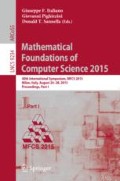Abstract
We investigate the computational complexity of the satisfiability problem of modal inclusion logic. We distinguish two variants of the problem: one for strict and another one for lax semantics. The complexity of the lax version turns out to be complete for EXPTIME, whereas with strict semantics, the problem becomes \({\mathsf{{NEXPTIME}}}\)-complete.
Access this chapter
Tax calculation will be finalised at checkout
Purchases are for personal use only
References
Blackburn, P., de Rijke, M., Venema, Y.: Modal Logic. Cambridge University Press, Cambridge (2001)
Galliani, P.: Inclusion and exclusion dependencies in team semantics - on some logics of imperfect information. Ann. Pure Appl. Logic 163(1), 68–84 (2012)
Galliani, P., Hannula, M., Kontinen, J.: Hierarchies in independence logic. In: Ronchi Della Rocca, S. (ed.) Proceedings of Computer Science Logic 2013. Leibniz International Proceedings in Informatics (LIPIcs), vol. 23, pp. 263–280 (2013)
Greenlaw, R., Hoover, H.J., Ruzzo, W.L.: Limits to Parallel Computation: P-Completeness Theory. Oxford University Press, Oxford (1995)
Hella, L., Kuusisto, A., Meier, A., Vollmer, H.: Modal inclusion logic: Being lax is simpler than being strict. arXiv, 1504.06409 (2015)
Hemaspaandra, E.: The price of universality. Notre Dame J. Formal Logic 37(2), 174–203 (1996)
Kontinen, J., Müller, J.-S., Schnoor, H., Vollmer, H.: Modal independence logic. In: Goré, R., Kooi, B.P., Kurucz, A. (eds.) Proceedings of Advances in Modal Logic, vol. 10, pp. 353–372. College Publications, London (2014)
Ladner, R.: The computational complexity of provability in systems of modal propositional logic. SIAM J. Comput. 6(3), 467–480 (1977)
Papadimitriou, C.H.: Computational Complexity. Addison-Wesley, Reading (1994)
Peterson, G., Azhar, S., Reif, J.H.: Lower bounds for multiplayer noncooperative games of incomplete information. Comput. Math. Appl. 41, 957–992 (2001)
Pratt-Hartmann, I.: Complexity of the two-variable fragment with counting quantifiers. JoLLI 14(3), 369–395 (2005)
Sevenster, M.: Model-theoretic and computational properties of modal dependence logic. J. Logic Comput. 19(6), 1157–1173 (2009)
Väänänen, J.: Dependence Logic. Cambridge University Press, Cambridge (2007)
Väänänen, J.: Modal dependence logic. In: Apt, K., van Rooij, R. (eds.) New Perspectives on Games and Interaction, pp. 237–254. Amsterdam University Press, Amsterdam (2008)
van Eijck, J.: Dynamic epistemic logics. In: Baltag, A., Smets, S. (eds.) Johan van Benthem on Logic and Information Dynamics, pp. 175–202. Springer, Heidelberg (2014)
Acknowledgements
The authors thank the anonymous referees for their comments. The third author is supported by DFG grant ME 4279/1-1. The second author acknowledges support from Jenny and Antti Wihuri Foundation.
Author information
Authors and Affiliations
Corresponding author
Editor information
Editors and Affiliations
Rights and permissions
Copyright information
© 2015 Springer-Verlag Berlin Heidelberg
About this paper
Cite this paper
Hella, L., Kuusisto, A., Meier, A., Vollmer, H. (2015). Modal Inclusion Logic: Being Lax is Simpler than Being Strict. In: Italiano, G., Pighizzini, G., Sannella, D. (eds) Mathematical Foundations of Computer Science 2015. MFCS 2015. Lecture Notes in Computer Science(), vol 9234. Springer, Berlin, Heidelberg. https://doi.org/10.1007/978-3-662-48057-1_22
Download citation
DOI: https://doi.org/10.1007/978-3-662-48057-1_22
Published:
Publisher Name: Springer, Berlin, Heidelberg
Print ISBN: 978-3-662-48056-4
Online ISBN: 978-3-662-48057-1
eBook Packages: Computer ScienceComputer Science (R0)

